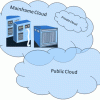Strategic advice to leverage new technologies
Technology is at the heart of nearly every enterprise, enabling new business models and strategies, and serving as the catalyst to industry convergence. Leveraging the right technology can improve business outcomes, providing intelligence and insights that help you make more informed and accurate decisions. From finding patterns in data through data science, to curating relevant insights with data analytics, to the predictive abilities and innumerable applications of AI, to solving challenging business problems with ML, NLP, and knowledge graphs, technology has brought decision-making to a more intelligent level. Keep pace with the technology trends, opportunities, applications, and real-world use cases that will move your organization closer to its transformation and business goals.
Recently Published
Last month I discussed the US National Security Agency's (NSA) electronic surveillance and data gathering practices (aka "Prism"), which were leaked by Edward Snowden, a former NSA contractor (with Booz Allen Hamilton) and previous CIA employee, to the Guardian and Washington Post news organizations (see
Five Challenges in Implementing Systems for Retail Analytics
Designing a technology platform that enables analytics demands a different mind-set as compared to designing one for operational needs. While defining the enterprise architecture (both data and application) is primarily about laying down the right dots pertinent to the business, analytics is about connecting those dots and sometimes ignoring existing connections for insights.
The collaborative nature of Agile projects has exposed participants to opportunities to experience a number of ingredients associated with group coherence (GC) in the research literature. We call these "Agile embedded ingredients," as they surface in Agile work. We present four here and discuss both their Agile appearance and the research about them. They are: (1) the commonly shared goal, (2) shared leadership, (3) trust and respect, and (4) practice.
Mobile Apps: Development, Markets, QA, and Monetization
The impact of the mobile software product grows every day, reaching a point in which mobile devices become one of the most important platforms for the distribution and utilization of user-oriented software. Mobile application stores host thousands of apps, reporting millions of downloads per day.
EA Value Proposition
In my last Advisor (see "Firmitas, Utilitas, Venustas"), I introduced some of the ideas presented by EA Conference Chair Chris Potts in his keynote at the IRM Enterprise Architecture Conference, "High Im
Many projects concentrate their efforts on implementing technology used to support the business needs (replace System X with System Y) or deliver new functionality. In meetings, the topic of conversation is usually about which application to purchase and which vendor to choose. Those are important issues, but equally important considerations are how your company will use the information to conduct business, the readiness of existing data, and how you can adapt the data to fulfill the requirements of the new system.













